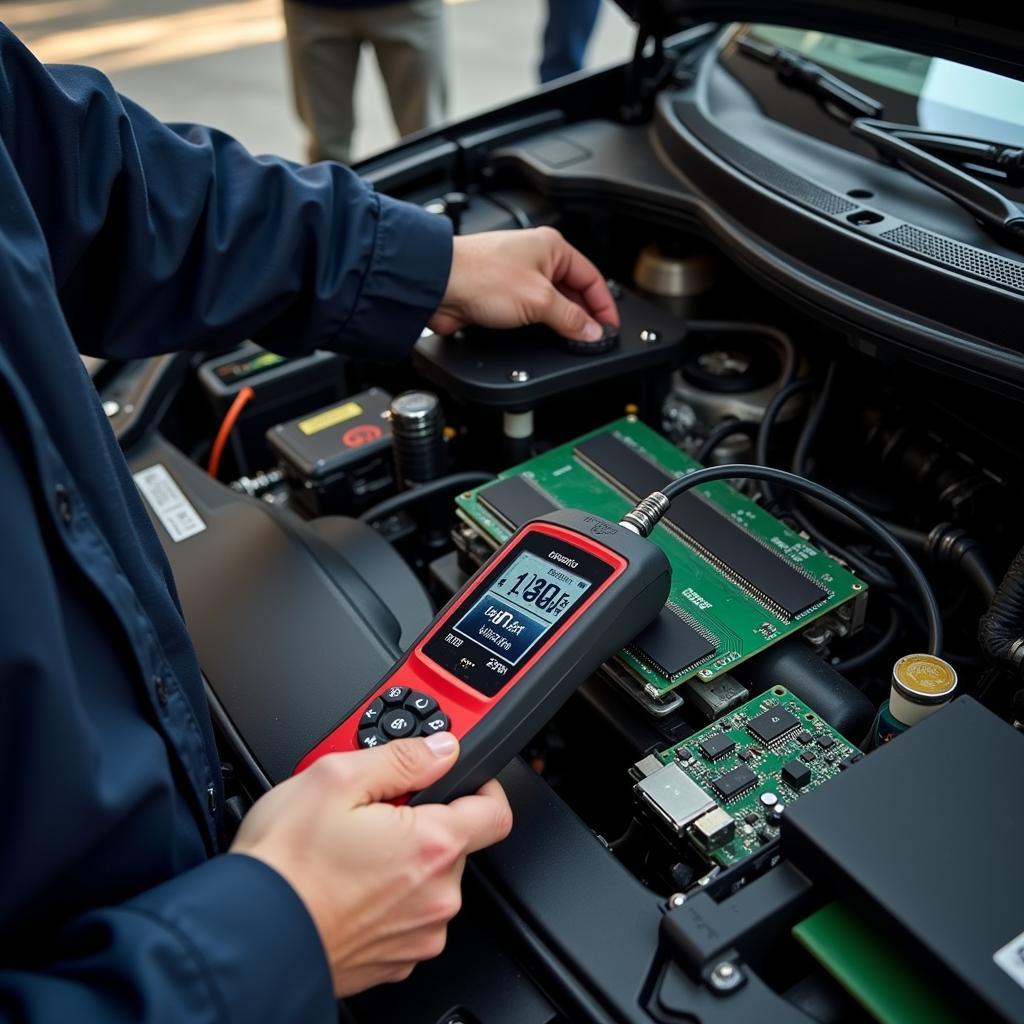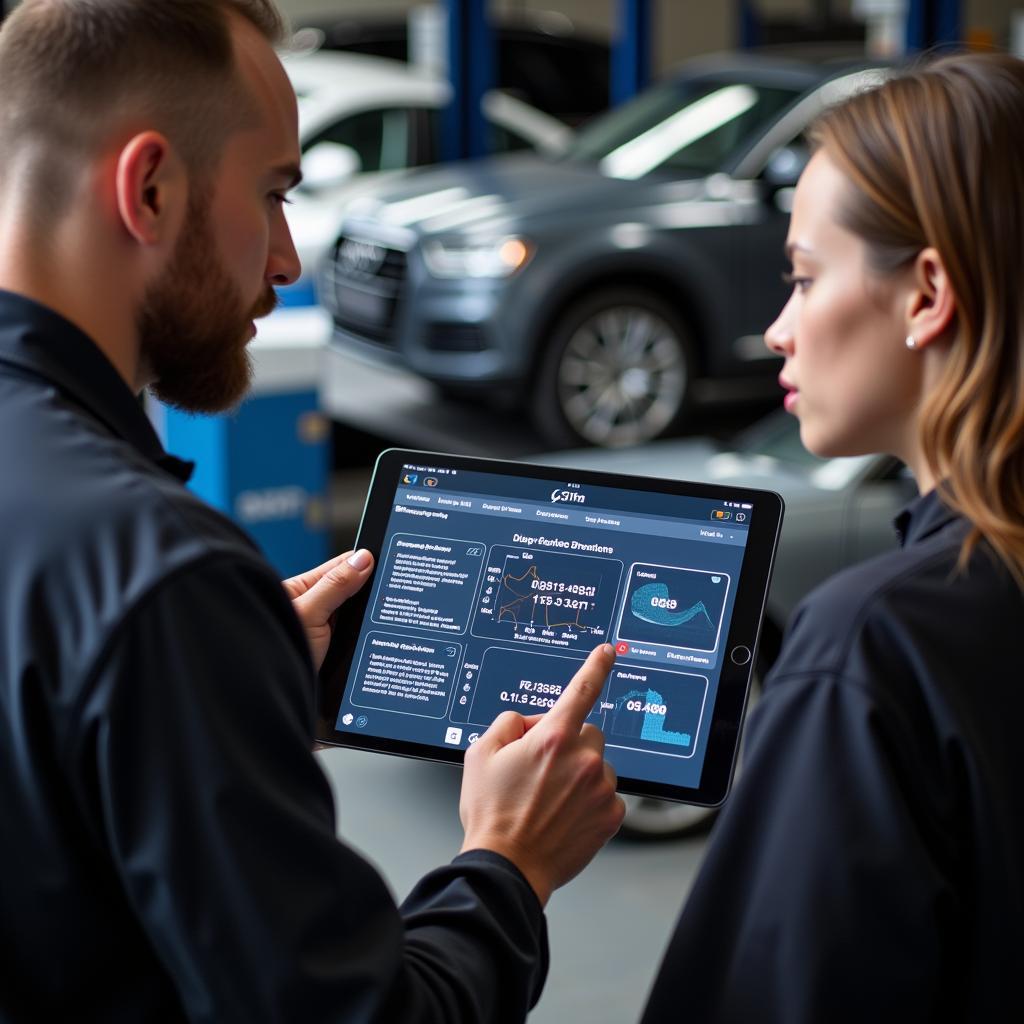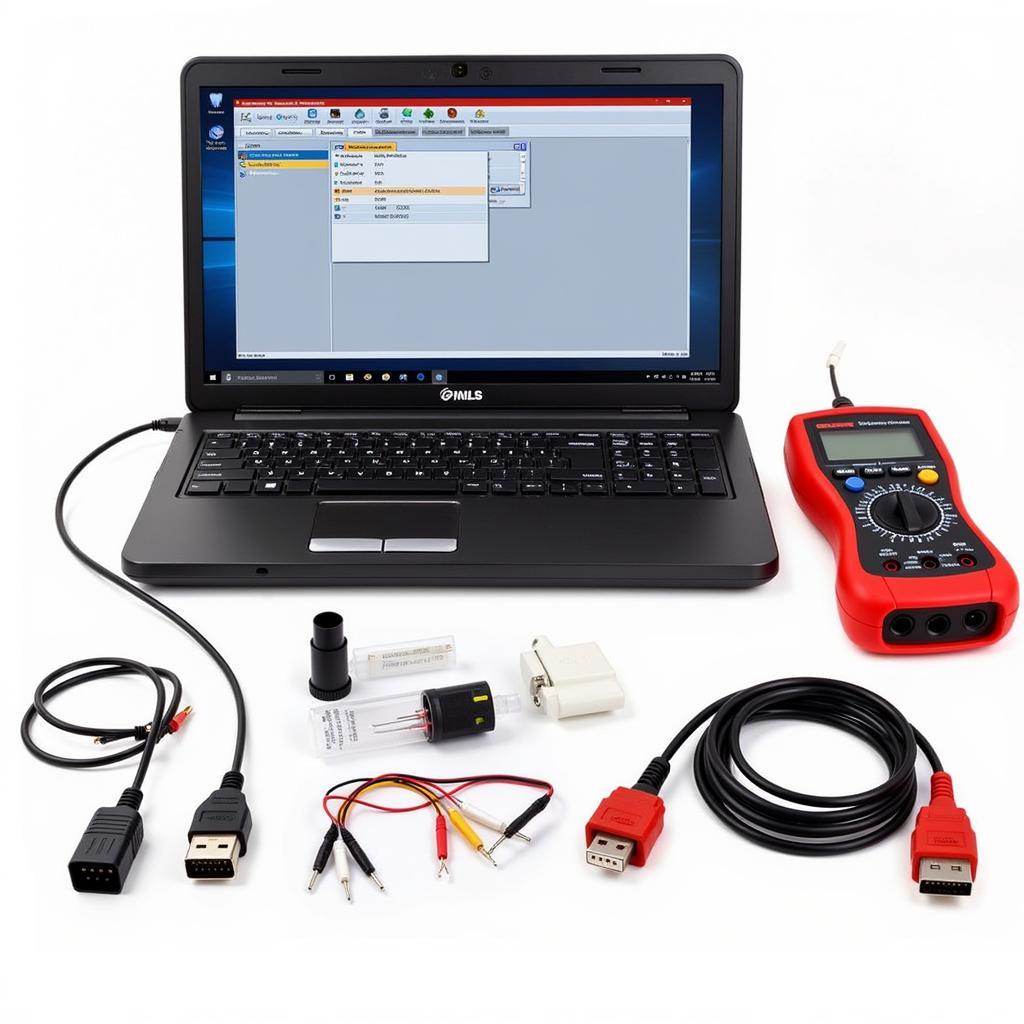When your car throws a temperamental tantrum, that check engine light glaring accusingly, your first thought might be, “Oh no, not again!” closely followed by, “How long is this going to take?” You’re not alone. Understanding how long car diagnostics take can be as clear as mud for most people. This article dives deep into the world of car diagnostics, demystifying the process and giving you a realistic timeframe.
 Car Diagnostic Process
Car Diagnostic Process
Factors Affecting Diagnostic Time: Simple to Complex
Think of car diagnostics like detective work for your car. Sometimes the culprit is obvious, like a loose gas cap. Other times, it requires Sherlock Holmes levels of investigation. Here are the key factors that influence the duration:
- Issue Severity: A simple sensor malfunction is quicker to diagnose than a complex electrical gremlin.
- Vehicle Age and Model: Newer cars with advanced computer systems can be diagnosed faster than older models.
- Mechanic Expertise: A seasoned mechanic with years of experience might pinpoint the issue quicker than someone less experienced.
- Diagnostic Equipment: Advanced scanners can retrieve data faster and provide more detailed information.
A Typical Diagnostic Timeline
While pinpointing an exact time is like predicting the weather, here’s a general idea:
1. Initial Scan (5-15 minutes): The mechanic connects a diagnostic scanner to your car’s computer system, reading the error codes. This is like taking your car’s pulse.
2. Code Interpretation (15-30 minutes): The mechanic deciphers the codes, which are like cryptic messages from your car. They use their knowledge, experience, and sometimes even online databases to understand what the codes indicate.
3. Further Investigation (30 minutes – several hours): This is where things can get lengthy. Depending on the complexity of the issue, the mechanic might need to:
- Visually inspect components: Think belts, hoses, fluids, and anything else related to the error codes.
- Test drive the vehicle: This helps them experience the problem firsthand.
- Consult technical manuals: Sometimes, the answer lies in the fine print.
- Run additional tests: This might involve specialized equipment or procedures.
4. Diagnosis and Recommendation (15-30 minutes): Once the detective work is done, the mechanic explains the problem and recommends repair options.
 Mechanic Explaining Diagnostic Results
Mechanic Explaining Diagnostic Results
Can Diagnostics Take Days?
In rare cases, yes. Imagine a phantom electrical issue that only rears its ugly head occasionally. Or a problem that requires specialized parts or expertise. These situations might require keeping your car at the shop longer.
How Much Does a Diagnostic Test Cost?
The cost varies depending on location, the complexity of the problem, and the shop’s hourly rate. On average, expect to pay between $80 and $150.
Do you want to know more about why a car diagnostic test is always necessary? Check out our article on why does a car always have to go on diagnostic.
DIY vs. Professional Diagnostics: When to Call in the Experts
While affordable OBD-II scanners are readily available, allowing you to read basic error codes yourself, remember this:
- Codes don’t tell the whole story: They indicate the general area of the problem, not necessarily the exact cause.
- Misinterpretation can be costly: Incorrectly diagnosing the problem can lead to unnecessary repairs.
When in doubt, consult a professional. They have the experience, knowledge, and tools to get to the root of the problem.
 Professional Car Diagnostic Tools
Professional Car Diagnostic Tools
Saving Time and Money: Proactive Car Care Tips
Just like regular doctor visits, preventative car care can save you headaches and hefty repair bills down the road.
- Schedule regular maintenance: Stick to your car’s recommended maintenance schedule.
- Address warning signs promptly: Don’t ignore those dashboard lights!
- Choose a trusted mechanic: Find a mechanic you trust and who communicates clearly.
Conclusion
While predicting the exact duration of a car diagnostic test is impossible without knowing the specifics, hopefully, this article sheds light on the process and factors involved. Remember, proactive car care and a trusted mechanic are your best allies in keeping those unexpected repair bills and lengthy diagnostic sessions at bay. If you’re ever unsure about your car’s health, it’s always best to err on the side of caution and seek professional help.
Need help determining if your diagnostic tool is compatible with your car? Visit our comprehensive guide on how i know if diagnostic tool support my car.
FAQs
1. Can I drive my car with the check engine light on?
It’s best to avoid driving and get it checked as soon as possible.
2. Will a diagnostic test tell me what’s wrong with my car?
Yes, it helps pinpoint the problem area and provides error codes that guide the mechanic.
3. Do I need to go to the dealership for a diagnostic test?
No, any reputable mechanic with the right equipment can perform a diagnostic test.
4. What is the most common reason for a check engine light to come on?
A loose gas cap is a surprisingly common culprit! Other frequent reasons include a faulty oxygen sensor or spark plugs.
5. What should I do if my car is still under warranty?
Refer to your warranty terms, as it might cover diagnostic tests and repairs.
Want to get a car diagnostic test done? Check out our guide on where to get a car diagnostic test done.
Curious about the meaning of “over-advanced driving” on a car diagnostic? Learn more about it in our dedicated article on what does over advanced driving mean on a car diagnostics.
Looking for a free car diagnostic? Discover your options by reading our article on where can i get a free car diagnostic.
Need immediate assistance with your car diagnostic needs? Don’t hesitate to contact us via WhatsApp at +1(641)206-8880 or email us at [email protected]. Our dedicated customer support team is available 24/7 to assist you.

Leave a Reply